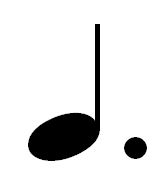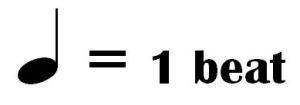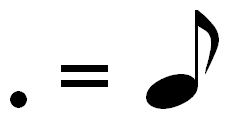You know you’ve found a dotted quarter note when you see a quarter note with a dot beside it.

Just as you might suspect, the name itself describes exactly what it looks like.
| ✅ The best self-study music theory book loved by all my readers and students. |
Let’s Figure It Out
What we already know is that a quarter note receives 1 beat in the 2/4, 3/4, and 4/4 time signatures.

Okay, so a dotted quarter note has to be worth at least 1 beat. However, there is a dot included that must increase the value somehow.
In order to find out just how much, we need to review the dot rule.
Dot Rule
The rule says this:
Add half the value of the note to the note.
Step 1 – Divide the quarter note in half. What do you get?

Yes, it’s 1/2 a beat.
This means the value of the dot is 1/2 a beat.

( Quick review: A single eighth note equals 1/2 a beat. That’s why you see an eighth note in these examples. The dot equals an eighth note.)
Step 2 – Now add the dot to the quarter note. How many beats total do you get?

You should have 1 1/2 beats total.
So, the dotted quarter note equals 1 1/2 beats.

That’s easy!
Tip
We can’t have 1/2 a beat missing in music. There need to be beats using whole numbers (except zero).
Dotted quarter notes are missing 1/2 a beat to reaching the whole number of 2. What are we going to do?
Well, we need to add another 1/2 a beat.
Do you remember what type of note or rest equals 1/2 a beat?
Yes, you got it. The single eighth note or eighth rest will work great in this case to complete the beats reaching the whole number 2.
We can add the eighth note before or after the dotted quarter note for a total of 2 beats.

You can do the same with the eighth rest.

This is why we never see a dotted quarter note sitting by itself. It’s usually accompanied by some other note or rest that will make up for the lack of 1/2 a beat.
An Easier Way to Count It
Whenever I problem-solve rhythms (notes and/or rests combined together), I like to break everything down into the smallest value you see on the page.
In this case, the eighth note is the smallest value.
So, I take the quarter note and divide it down into eighth notes also.

The quarter note equals 2 eighth notes total. Do you remember how much the dot is worth?
Yes, 1/2 a beat.
A single eighth note represents 1/2 a beat. That means the dot is the same as 1 eighth note.

Now, it’s easier to see how to count it.

We made it! Not only will you be an expert on dotted quarter notes, but with any type of note or rest that includes a dot.
A little math is all it takes to solve any rhythm or note value.
Recommended Music Theory Books
✅ The best self-study music theory book loved by all my readers and students.

I have a 3/4 piano sheet showing an eight note immediately followed by a dotted whole note. How do play it? Do I make a 2nd strike or just hold the note 6 beats?
It sounds like a major misprint in the music. 1 eighth note + 1 dotted whole note is more than 3 counts in a measure.
My mistake, sorry. it is not 1 eight note + 1 dotted whole note.
Rather, 1 eight note + 1 dotted eight note.